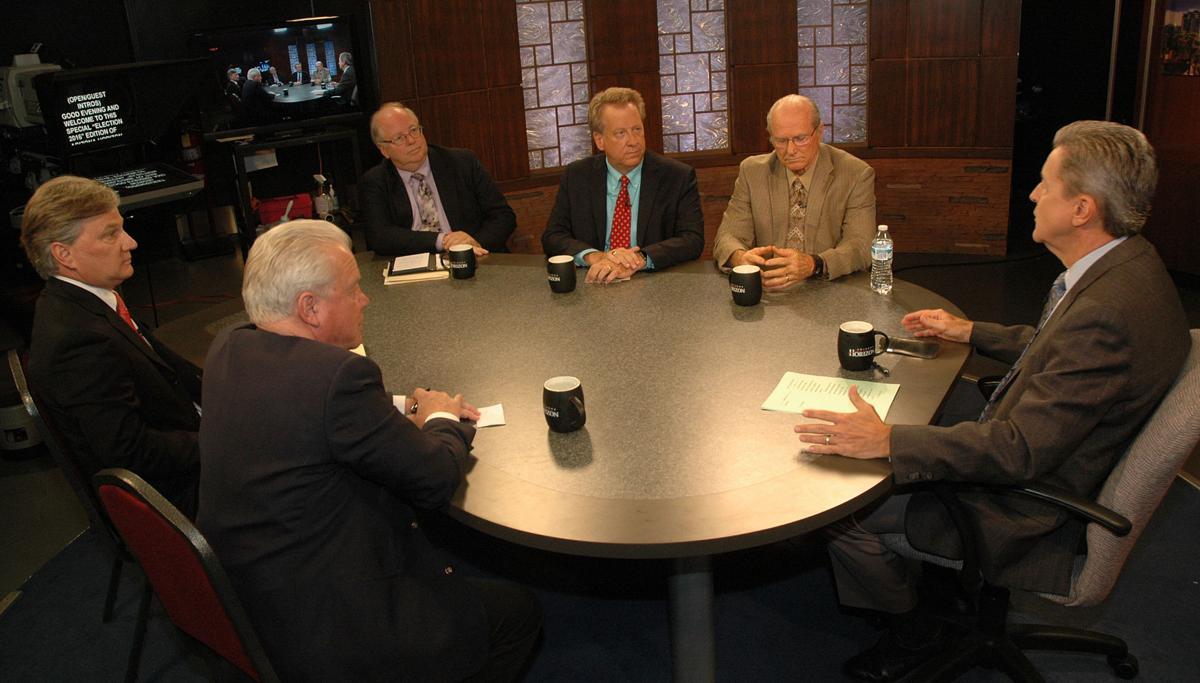PHOENIX — A major provider of rooftop solar units is putting $140,000 into the effort to re-elect Republican Bob Burns and to elect Democrat Bill Mundell to the Arizona Corporation Commission.
The disclosure Tuesday came as the five candidates for the three available seats on the commission, which sets utility rates, debated whether to force Arizona Public Service to disclose what it spent in 2014 to help elect two other Republicans.
Burns has issued a subpoena for records of APS and its parent company, Pinnacle West Capital Corp. But state Attorney General Mark Brnovich has said Burns’ ability to get into Pinnacle West’s books will require a majority vote of the five-member commission, and to date the other four Republicans currently on the panel have balked.
Mundell and fellow Democrat Tom Chabin have promised that if elected, they will provide Burns with the necessary votes.
Save Our State Now and the Arizona Free Enterprise Club funneled $3.2 million into the 2014 campaign to secure the election of Republicans Tom Forese and Doug Little. (Forese and Little are not up for re-election this year; ACC elections are staggered by year.)
Both groups are classified under federal tax law as “social welfare” organizations, which they contend exempts them from having to divulge their donors.
While the question of APS influence in electing commissioners is dominating much of this year’s race, it was disclosed Tuesday that a group funded by SolarCity is doing to a certain extent this year what APS is accused of doing two years ago.
It has put $140,000 into an independent campaign to help elect Mundell and secure another four-year term for Burns.
SolarCity, like APS, has an interest in the makeup of the commission. The panel will decide as early as next year how to structure rates for utility customers who generate some of their own power through solar. Any decision on those charges, as well as how much utilities have to pay customers for the power they’re now forced to buy from homeowners, could determine whether rooftop solar remains affordable.
But SolarCity lobbyist Kris Mayes said there’s a significant difference. She said SolarCity, which supplies and installs rooftop solar units, is disclosing its spending; the refusal of APS to say what it did or did not spend in the past or might spend in the future leaves voters in the dark.
Burns said he personally wishes SolarCity wasn’t spending money to help his re-election. But he pointed out that Arizona law precludes him from having any say in what is spent independent of his campaign.
“I wish everyone would stay out of the race,” Mundell agreed. “The difference is one word: disclosure.”
All five contenders appear to agree that, ethical issues aside, APS probably has a legal right to spend as much as it wants to influence elections.
“What we’re talking about is transparency,” said Republican Boyd Dunn.
“The constitutional right is to spend it, but not to hide it,” Burns said, arguing that it isn’t just an academic issue. “When a regulated utility spends at the rate that APS is perceived to have spent in 2014, integrity’s at risk.”
Burns quickly added that he’s not saying that either Forese or Little was aware of the actual source of the money being spent.
“The voters and the ratepayers are the critical ones that did not know for sure where the money was coming from,” Burns said, adding it’s a “slippery slope if it’s allowed to continue.”
What’s worse, Chabin said, is that customers are the ones footing the bill so that the utilities can elect people hey believe are more likely to approve their rate-hike requests.
“Every time you paid your bill, APS took a little bit of that money, put it into a ‘dark money’ campaign to invest over $3 million to elect the commission they wanted,” Chabin said.
While Mundell and Chabin cite the $3.2 million spent by Save Our State Now and the Arizona Free Enterprise Club as fact, that has never been proven.
An APS spokesman will neither confirm nor deny any political spending in the election. APS executives have said that if the company did spend any money that way, it came out of shareholder profits, not customer bills.
The issue of Burns’ subpoena has put incumbent Republican Andy Tobin on the defensive. While Tobin said he supports disclosure, he also voted to undermine a contract Burns made with a consultant to analyze any information APS and Pinnacle West provide.
Tobin defended his vote, saying the consultant was not acceptable to others. And he pointed out that he did vote to allow Burns to hire an outside lawyer.





